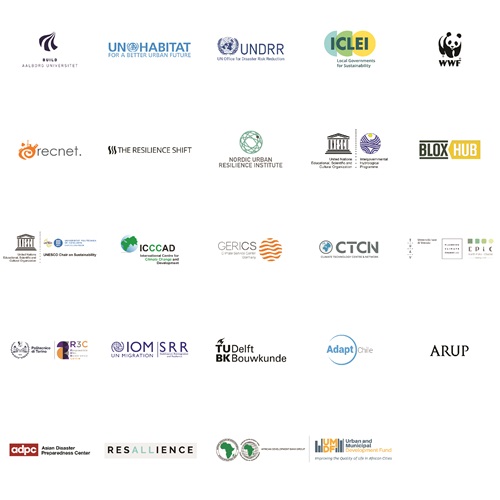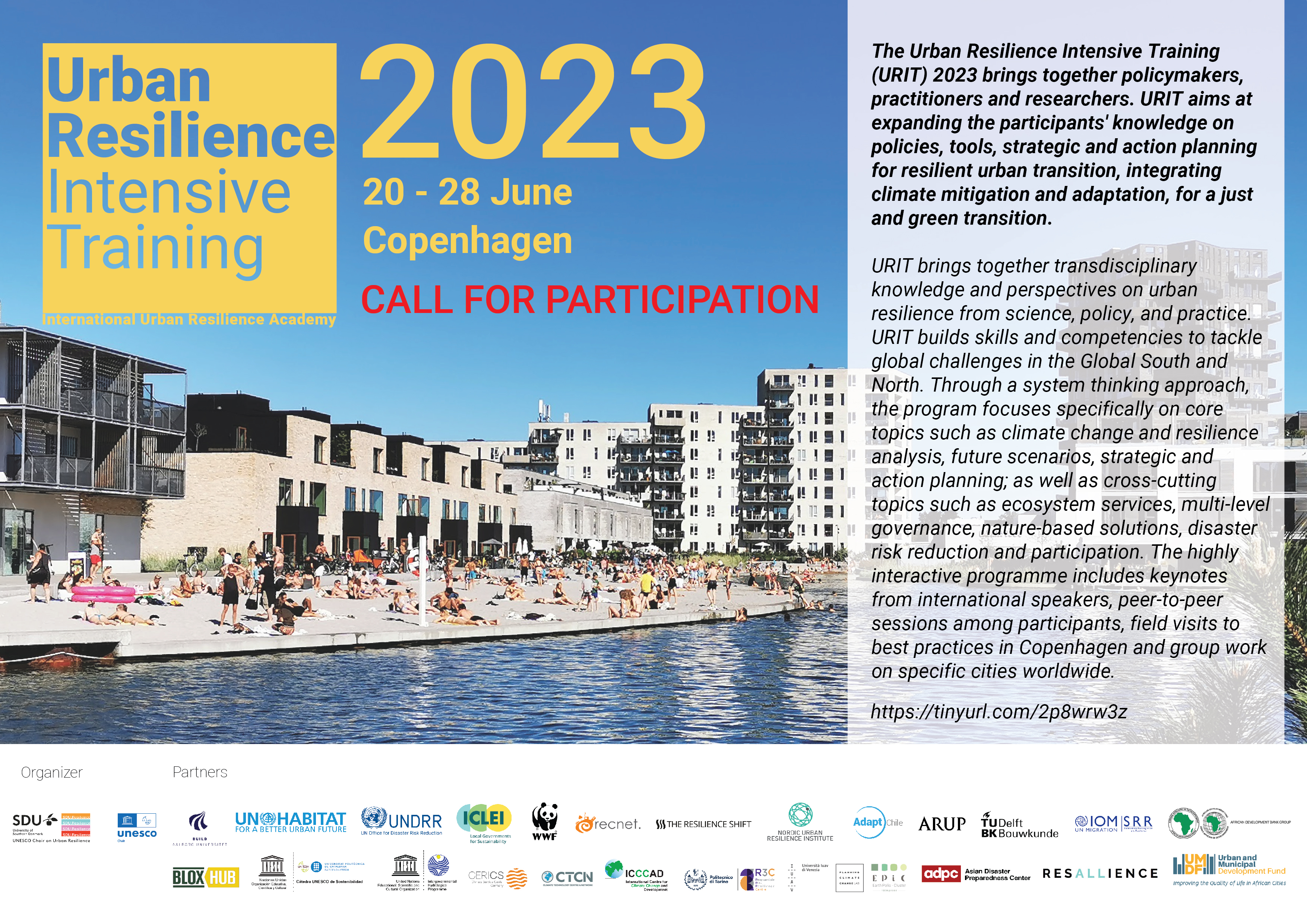The Urban Resilience Intensive Training (URIT) 2023 brings together policymakers, practitioners and researchers to Copenhagen between the 20th and 28th of June 2023. URIT aims at expanding the participants' knowledge on policies, tools, strategic and action planning for resilient urban transition, integrating climate mitigation and adaptation, for a just and green transition.
URIT brings together transdisciplinary knowledge and perspectives on urban resilience from science, policy, and practice. URIT aims at building skills and competencies to tackle global challenges in the Global South and North. Through a system thinking approach, the program focuses specifically on core topics such as climate change and resilience analysis, future scenarios, strategic and action planning; as well as cross-cutting topics such as ecosystem services, multi-level governance, nature-based solutions, disaster risk reduction and participation. The highly interactive programme includes keynotes from international speakers, peer-to-peer sessions among participants, field visits to best practices in Copenhagen and group work on specific cities worldwide.
Read & download the call for participation here
See the 2022 edition of the training here , and report results of 2022 edition here
Urban Resilience Intensive Training 2023
Today over 50% of the world population lives in urban areas, and cities account for 60-80% of global energy consumption and the same level of greenhouse gases emissions, producing 50% of global waste, consuming 75% of natural resources and producing 80% of global GDP.
Cities and their populations are vulnerable and increasingly exposed to rapid and slow on-setting climate and environmental disasters, which frequency and intensity are growing exponentially. Yet, cities are also major centres of economic activity, social life and culture, innovation and knowledge-creation.
Urban resilience aims to increase the ability of urban systems to respond systemically and dynamically to present and future shocks and stresses related to major global challenges as: unsustainable development patterns, rapid and unplanned urbanization, climate change mitigation and adaptation.
Urban resilience is instrumental in addressing both causes and effects of these major global challenges, re-thinking how cities are designed, planned and managed, and fostering innovation. The scientific research on urban resilience has been exponentially growing in the last decade, parallelly a growing number of cities worldwide started developing resilience-related plans and actions, following the recommendations and prescriptions national and international policies, as: Sustainable Development Goals, Paris Agreement, New Urban Agenda and Sendai Framework for Disaster Risk Reduction.
The key challenge for urban resilience is to co-develop and harmonize scientific and practice-led knowledge to support informed and science-based decision and policymaking, to enable our cities to evolve and innovate.
Cities, both in the Global South and North, will need to re-think how they are designed, planned, managed, and lived. However, many lessons can already be distilled and can be used to strengthen the adaptive capacities of cities to face multiple and even concurrent global crises.
The training builds the core skills and competencies for urban resilient transition, including fundaments of urban resilience in research, climate science, international and national policies, and resilience in action. The participants will also acquire core competencies in system thinking, system dynamics, transition theory and transformative strategies/actions.
The training adopts a process design methodology, through which the participants will learn about system and stakeholder analysis methods, future scenarios (forecasting, visioning and backcasting), and strategic and action planning.
The training is funded on problem-based learning. The participants, divided into small groups, will respond to a specific challenge, applying specific tools and methods through a system thinking approach.
This year's challenge is focusing on just and green transition in the frame of climate change and how to enhance urban resilience through transformative strategies and actions.
The training will also focus on key cross-sectoral issues, such as multi-level governance, nature-based solutions, finance, appropriate technology, participatory processes and stakeholders' involvement, generation of co-benefits, urban metabolism, and circular economy.
The highly interactive programme includes keynotes from international speakers, peer-to-peer sessions among participants, field visits to best practices in Copenhagen and group work on specific cities worldwide.
The participants will develop their knowledge on:
- The basis of urban resilience and global challenges science, and research development in different disciplinary contexts.
- International policies (Sustainable Development Goals, Paris Agreement, New Urban Agenda and Sendai Framework for Disaster Risk Reduction).
- Urban resilience practices with specific case studies from cities worldwide, including strategic plans, action plans, and technological solutions.
- Cross-sectorial and thematic issues.
The participants will develop competencies based on system thinking through a process design methodology for urban resilience, including:
- System mapping & stakeholders’ analysis,
- Analysing current and future urban trends and drivers, at local and global level,
- Future scenarios methods: visioning and backcasting,
- Strategic and action planning.
Urban Resilience Intensive Training 2023 welcomes middle and senior policymakers, practitioners, and scientists/researchers with different disciplinary backgrounds, including engineering, architecture, planning, environmental, economic and social sciences.
Practitioners from the private and public sectors, including also non-profit organizations.
Policymakers from national and subnational governments and from international and intergovernmental organizations.
Scientists and Researchers from universities and research organizations, including PhD candidates, researchers and lecturers.
The course will be organised from Tuesday, 20th June, until Thursday, 28th June 2023 (7 working days) in Copenhagen.
Before starting the Urban Resilience Intensive Training, a self-organised preparation will include reading materials and watching recorded lectures. Then, the seven days of intensive training are mainly organised with lectures and group work. Upon the conclusion of the training, the participants will receive a Certificate of Participation, for which it is required to attend 80 % of the daily sessions, contribute to the group work and submit the required outputs.The entire training, including lectures, group work and self-learning, is approximately 140 hours, equivalent to 5 ECTS.
Course date: 20th – 28th June 2023
Speakers:
- Cristóbal Reveco Umaña, Climate Service Center (GERICS), Adapt-Chile
- Fruzsina Straus, United Nations Human Settlements Programme (UN-Habitat)
- Jacob Rasmussen, Roskilde University (RUC)
- Maryke van Staden, ICLEI - Local Governments for Sustainability
- Nicola Tollin, UNESCO Chair on Urban Resilience, University of Southern Denmark (SDU)
- Pasquale Capizzi, ARUP
- Sara Candiracci, ARUP
- Sebastian Mernild, University of Southern Denmark (SDU)
- Stelios Grafakos, Global Green Growth Institute (GGGI)
- Simone Sandholz, United Nations University (UNU-EHS)
- (Speaker TBC), Asian Disaster Preparedness Center (ADPC)
Download the agenda for URIT 2023
Urban Resilience Intensive Training 2023 welcomes middle and senior policymakers, practitioners, and scientists/researchers with different disciplinary backgrounds, including engineering, architecture, planning, environmental, economic and social sciences.
English language proficiency is required.
There is a limited number of places available. Inscription will be on first come first serve basis.
- 900 EUR (equivalent to 6,750 DKK) - Regular fee, no later than 12 June 23:59 CET.
- 600 EUR (equivalent to 4,500 DKK) - Early bird fee, no later than 1 May 23:59 CET, limited to 15 participants.
- 300 EUR (equivalent to 2,250 DKK) - Reduced fee for the participants from the Least Developed Countries*, no later than 12 June 23:59 CET, limited to 10 participants.
The fee covers only participation in the Urban Resilience Intensive Training 2023. The participants shall cover all other expenses, such as travel, subsistence (hotel, meals, etc.) and visa fee.
* A Limited number of fee waivers are available for participants that are nationals of and currently working in one of the Least Developed Countries (LDC). Please refer to the United Nations' list of LDC countries. Upon registration, applicants must complete and sign an affidavit confirming the above-mentioned condition.
Register at: https://event.sdu.dk/urit23
Registration is open until 12 June 23.59 CET.
Once the registration is done, participants are responsible for visa application in their country; in case of visa denial the training fee will not be refunded.
If you have citizenship outside of EU, you should contact Luna Kyung Keller Larsen luna@sdu.dk from our International Staff Office at the University of Southern Denmark to determine, if you need a short visa to enter Denmark. Kindly contact Luna as soon as possible, as the visa process can take up to two months from the beginning of the process till you get the visa issued.
You can contact Luna Kyung Keller Larsen at: luna@sdu.dk
For questions related to payment method and Conference Manager platform, please contact: Charlotte Kjær Bruun at cbp@iti.sdu.dk
In terms of other enquiries regarding the registration please contact IURA Organizing Committee at kawi@iti.sdu.dk and tek-ura@iti.sdu.dk
Organisers

Partners






